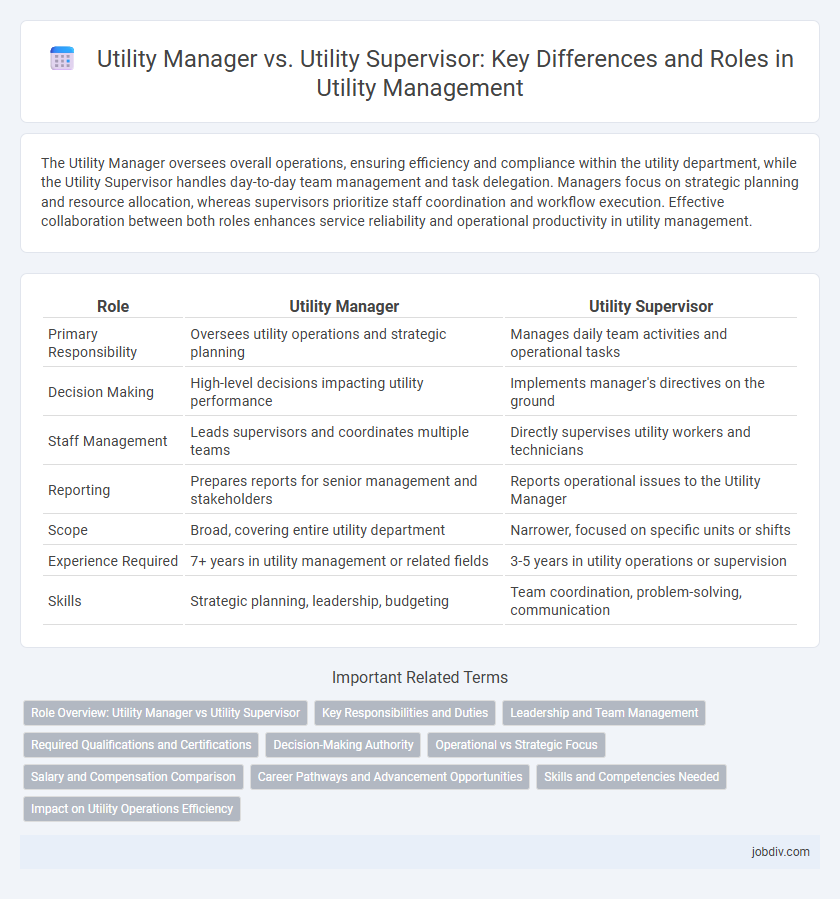The Utility Manager oversees overall operations, ensuring efficiency and compliance within the utility department, while the Utility Supervisor handles day-to-day team management and task delegation. Managers focus on strategic planning and resource allocation, whereas supervisors prioritize staff coordination and workflow execution. Effective collaboration between both roles enhances service reliability and operational productivity in utility management.
Table of Comparison
| Role | Utility Manager | Utility Supervisor |
|---|---|---|
| Primary Responsibility | Oversees utility operations and strategic planning | Manages daily team activities and operational tasks |
| Decision Making | High-level decisions impacting utility performance | Implements manager's directives on the ground |
| Staff Management | Leads supervisors and coordinates multiple teams | Directly supervises utility workers and technicians |
| Reporting | Prepares reports for senior management and stakeholders | Reports operational issues to the Utility Manager |
| Scope | Broad, covering entire utility department | Narrower, focused on specific units or shifts |
| Experience Required | 7+ years in utility management or related fields | 3-5 years in utility operations or supervision |
| Skills | Strategic planning, leadership, budgeting | Team coordination, problem-solving, communication |
Role Overview: Utility Manager vs Utility Supervisor
Utility Managers oversee the entire utility operations, including strategic planning, budgeting, and compliance with regulatory standards to ensure efficient service delivery. Utility Supervisors focus on coordinating daily field activities, managing personnel, and troubleshooting operational issues to maintain system reliability. Both roles require strong leadership and technical expertise, but managers prioritize long-term objectives while supervisors handle immediate operational execution.
Key Responsibilities and Duties
Utility Managers oversee the entire utility department, managing budgets, coordinating maintenance schedules, and ensuring regulatory compliance to optimize resource allocation and operational efficiency. Utility Supervisors focus on supervising daily field operations, directing workforce activities, troubleshooting system issues, and enforcing safety protocols to maintain uninterrupted utility services. Both roles require strong leadership skills, but the Utility Manager emphasizes strategic planning while the Utility Supervisor handles tactical execution.
Leadership and Team Management
Utility Managers oversee overall operations, strategic planning, and resource allocation to ensure efficient service delivery, demonstrating strong leadership in driving organizational goals. Utility Supervisors focus on direct team management, supervising daily staff activities, and enforcing safety protocols to maintain productivity and compliance. Both roles require effective communication and problem-solving skills, but Utility Managers engage more in high-level decision-making while Supervisors handle frontline team coordination.
Required Qualifications and Certifications
Utility Managers typically require a bachelor's degree in engineering, business administration, or environmental science, along with professional certifications such as Certified Utility Manager (CUM) or Project Management Professional (PMP). Utility Supervisors often need a high school diploma or associate degree, with certifications like Occupational Safety and Health Administration (OSHA) compliance and Water Treatment Operator licenses being essential. Both roles benefit from strong leadership skills, but Utility Managers generally demand advanced qualifications and broader industry certifications to oversee complex utility operations.
Decision-Making Authority
Utility Managers typically hold greater decision-making authority than Utility Supervisors, overseeing strategic planning and budget allocation for utility operations. Utility Supervisors focus on day-to-day operational decisions, ensuring staff performance and compliance with safety standards. This hierarchical distinction allows Managers to direct long-term utility projects while Supervisors manage immediate workforce and maintenance issues.
Operational vs Strategic Focus
Utility Managers concentrate on strategic planning, resource allocation, and long-term infrastructure development to enhance utility services and ensure sustainable operations. Utility Supervisors focus on daily operational tasks, overseeing workforce activities, maintaining equipment functionality, and addressing immediate service issues to ensure smooth utility delivery. The Manager's role drives organizational goals and policy implementation, while the Supervisor ensures effective execution on the ground.
Salary and Compensation Comparison
Utility Managers typically earn a higher salary than Utility Supervisors, reflecting their broader responsibilities and leadership roles within utility operations. According to industry salary data, Utility Managers in the United States earn an average annual salary ranging from $75,000 to $120,000, while Utility Supervisors earn between $55,000 and $85,000. Compensation packages for Utility Managers often include bonuses, benefits, and profit-sharing options that exceed those offered to Utility Supervisors, highlighting the financial advantages of advancing to managerial positions in the utility sector.
Career Pathways and Advancement Opportunities
Utility Managers oversee entire utility operations, coordinating teams and managing budgets, positioning them for executive roles such as Director of Utilities. Utility Supervisors focus on daily workforce management and operational efficiency, often progressing to Utility Manager roles through experience and leadership development. Career advancement in utilities emphasizes gaining technical expertise, project management skills, and certifications like Certified Utility Manager (CUM) to unlock higher-level positions.
Skills and Competencies Needed
Utility Managers require advanced skills in strategic planning, regulatory compliance, and financial management to oversee complex utility operations effectively. Utility Supervisors need strong technical knowledge, team leadership abilities, and problem-solving skills to coordinate daily maintenance and operational tasks. Both roles demand proficiency in safety protocols and communication to ensure efficient and reliable utility service delivery.
Impact on Utility Operations Efficiency
Utility managers oversee strategic planning and resource allocation, driving long-term improvements in utility operations efficiency. Utility supervisors focus on daily operational supervision and workforce coordination, ensuring immediate task execution and adherence to safety protocols. Both roles are critical, but utility managers significantly influence overall system optimization and cost reduction.
Utility Manager vs Utility Supervisor Infographic

 jobdiv.com
jobdiv.com